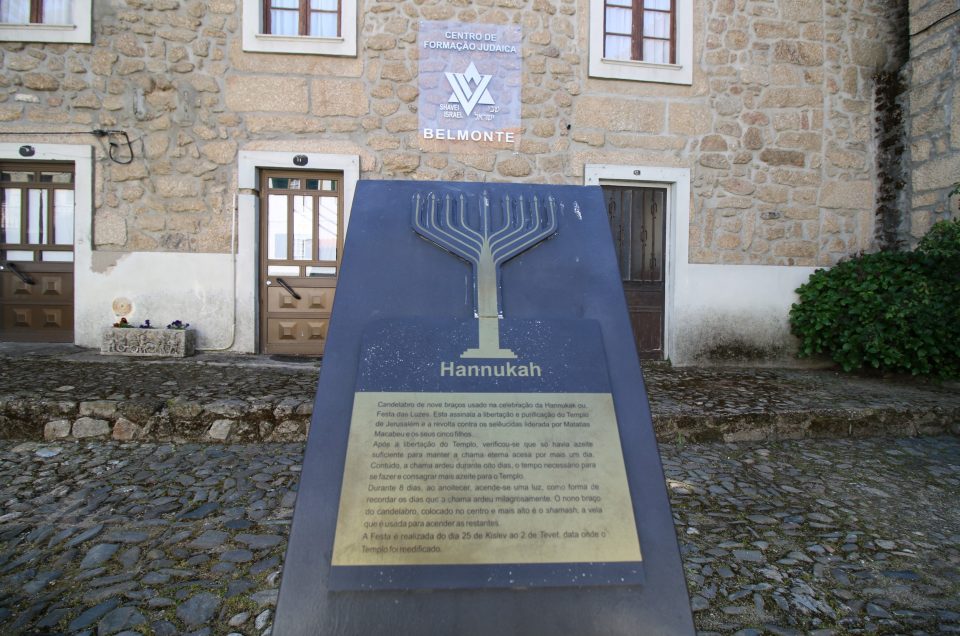Nestled in the foothills of Portugal’s Serra da Estrela mountains lies Belmonte, a small town with a history unlike any other in Europe. To the casual visitor, it may seem like one of Portugal’s many picturesque villages — granite houses, cobbled alleys, and a medieval castle gazing over rolling hills. Yet behind this quiet façade is a story of resilience that has captured the world’s attention: for more than 500 years, Belmonte’s Jewish community secretly preserved its faith, outlasting persecution, exile, and the Inquisition.
Today, Belmonte is celebrated as the most important Jewish village in Europe. It is the only place on the continent where a Jewish community has remained unbroken since the Middle Ages, passing traditions quietly from generation to generation. For travelers interested in Jewish history, culture, or simply human resilience, Belmonte offers one of the most profound experiences in Portugal — and indeed, in Europe.
A Refuge After Expulsion
Belmonte’s story begins in the late 15th century, when thousands of Jews expelled from Spain in 1492 fled across the border into Portugal. Initially welcomed, their situation changed dramatically in 1497 when King Manuel I ordered the forced conversion of all Jews in Portugal. Public worship was forbidden, synagogues were closed, and Jewish life was driven underground.
While many converted, emigrated, or fell victim to the Inquisition, Belmonte’s Jews chose a different path. They became crypto-Jews, or “New Christians” outwardly, while continuing to practice their faith in secret. Behind shuttered windows, families observed Shabbat, recited prayers from memory, and followed dietary laws. These customs were passed quietly through the centuries, protected from outsiders, even from neighbors, to ensure survival.
This remarkable secrecy endured for centuries. It was not until the early 20th century that scholars rediscovered Belmonte’s crypto-Jews, astonished to find a community still practicing elements of Judaism in isolation — without rabbis, without books, yet still deeply connected to their faith.
The Return to the Open
The fall of the Estado Novo dictatorship in 1974 brought new freedoms to Portugal, including religious expression. Slowly, Belmonte’s community began to reemerge publicly as Jews, reconnecting with wider Judaism after centuries of secrecy.
In 1997, a defining moment arrived: the Beit Eliahu Synagogue was inaugurated, giving Belmonte its first open synagogue in 500 years. Modest but meaningful, it represents not only survival, but renewal. Belmonte also established a Jewish cemetery — another milestone, since Jewish burial had been forbidden for centuries.
Alongside these developments, the Jewish Museum of Belmonte opened its doors, becoming the first museum in Portugal entirely dedicated to Jewish history. Together, these sites transformed Belmonte into a center for both local community life and international heritage tourism.
Walking Through Belmonte’s Jewish Quarter
For visitors, the best way to understand Belmonte is on foot. Its historic center still preserves the layout of the medieval Jewish quarter, where generations of families once lived discreetly. Stone houses with thick walls line narrow streets, and on some doorposts, faint grooves mark where mezuzahs once hung.
The Jewish Museum of Belmonte (Largo do Castelo, 6250-048 Belmonte) is the essential starting point. Its collection includes ritual objects, oral testimonies, and exhibits on daily life during centuries of secrecy. It contextualizes how the community preserved its traditions without contact with global Jewry — a phenomenon almost without parallel.
Nearby, the Beit Eliahu Synagogue (Rua da Judiaria) is a working synagogue where the local Jewish community gathers. While access is generally restricted to practicing Jews, it remains a powerful symbol of revival.
For a broader perspective, the Castle of Belmonte overlooks the town and the surrounding Serra da Estrela. This medieval fortress, originally built in the 12th century, was once a silent witness to the village’s hidden traditions. From its ramparts, the sweeping views suggest both refuge and vigilance.
The Jewish Cemetery
Another poignant site is the Jewish Cemetery of Belmonte, inaugurated in 1996. Located just outside the town, it was the first Jewish cemetery established in Portugal since the Inquisition. For centuries, families here had no choice but to bury their dead in Catholic cemeteries. The creation of this cemetery signaled not only religious freedom, but a profound act of dignity and memory for generations past.
A Community Alive
What makes Belmonte unique is that it is not just a museum piece. Unlike the Jewish quarters of Spain, France, or even elsewhere in Portugal, Belmonte has a living Jewish community. Families gather for Shabbat, celebrate holidays, and keep kosher homes.
Today, Belmonte is home to around 200 Jews — a small number, yet vibrant in its symbolism. The community maintains close ties with Jewish organizations worldwide and receives visitors from across the globe who come to learn, connect, and pay tribute.
As one Portugal Magik guest shared, “Standing in Belmonte, I felt like I was witnessing history not written in books, but alive in the people themselves.”
Surrounding Jewish Villages
Belmonte’s story does not stand alone. The Beira Interior region is dotted with villages that also hold traces of Jewish presence:
-
Sortelha – A beautifully preserved medieval village where mezuzah marks are still visible on granite homes.
-
Caria – Once home to Jewish families who preserved traditions in private.
-
Trancoso – Famous for the Isaac Cardoso Jewish Interpretation Centre and the Beit Mayim Hayim Synagogue.
-
Castelo de Vide – With its medieval synagogue and Jewish quarter, one of Portugal’s richest Jewish heritage towns.
Together, these villages form an unforgettable circuit of Jewish heritage, best explored over several days with a private driver-guide.
Belmonte’s Wider Heritage
While Jewish history is the core of Belmonte’s identity, the village offers much more. It is also the birthplace of Pedro Álvares Cabral, the navigator who “discovered” Brazil in 1500. A museum in his honor (Museu dos Descobrimentos) provides insight into Portugal’s Age of Discoveries.
The surrounding Serra da Estrela Natural Park is Portugal’s highest mountain range, famous for its dramatic granite landscapes, hiking trails, and artisanal cheese. Combining heritage with nature makes Belmonte an especially rewarding stop for luxury travelers.
Staying in Belmonte
For travelers seeking comfort, Belmonte offers both central and boutique-style accommodation:
-
Hotel Sinai – Av. das Tílias 1, 6250-066 Belmonte. A modern hotel in the heart of Belmonte, within walking distance of the synagogue, Jewish Museum, and castle. Comfortable rooms, panoramic views, and easy access to all heritage sites. Website
-
Pousada Convento de Belmonte – Estrada da Serra da Esperança, 6250-000 Belmonte. A former convent turned boutique hotel just outside the town. Elegant rooms, a refined restaurant, and sweeping views of the Serra da Estrela mountains. Website
Dining in Belmonte
Belmonte’s cuisine reflects the hearty flavors of the Beira Interior, with regional specialties like lamb, mountain cheeses, and traditional olive oil. For fine dining:
-
Convento de Belmonte Restaurant – Within the Pousada, offering refined interpretations of regional dishes with panoramic views.
-
Varanda da Estrela – Rua Pedro Álvares Cabral, Belmonte. A cozy restaurant serving authentic Portuguese cuisine with local ingredients.
Kosher meals can be arranged in advance through the Jewish community — something Portugal Magik often facilitates for its guests.
Luxury Travel Experience
Exploring Belmonte and its Jewish heritage is best done through a private guided journey. Portugal’s interior is not easily accessible by train or public transport, and the subtleties of Belmonte’s story are best understood with an expert.
Portugal Magik Private Tours has been specializing in Jewish heritage itineraries for over 14 years. Guests travel in luxury Mercedes-Benz vehicles with knowledgeable, English-speaking driver-guides. Every journey is personalized — whether it’s combining Belmonte with Lisbon and Porto, or creating a multi-day tour through the Beira Interior Jewish villages.
Why Belmonte Matters
In a continent where so many Jewish communities were destroyed, Belmonte stands apart as a symbol of survival. Its people endured centuries of secrecy, risk, and fear, yet they never let their identity vanish. Today, their story resonates with visitors from all backgrounds, reminding us of the resilience of faith and the endurance of cultural memory.
For Jewish travelers, Belmonte is a place of pilgrimage. For others, it is an inspiring testament to human perseverance. Either way, it is a destination unlike any other in Europe.
Plan Your Journey with Portugal Magik
To truly experience Belmonte’s significance, travel should be immersive, comfortable, and tailored. With Portugal Magik Private Tours, guests can explore not only Belmonte, but also the wider Jewish heritage of Portugal — from Lisbon’s synagogues to Porto’s museums and the hidden mountain villages of the interior.
Book Your Portugal Experience:
-
Explore our bestseller tours: https://portugal-magik.com/multi-day-tours/
-
Best Private Day Tours Around Lisbon: https://portugal-magik.com/private-day-tours/
-
Read Top Guests Reviews: https://portugal-magik.com/reviews/
-
Contact Us: https://portugal-magik.com/contact/
Fill in the form below to request your custom Jewish heritage itinerary, and discover for yourself why Belmonte is considered the most important Jewish village in Europe.






